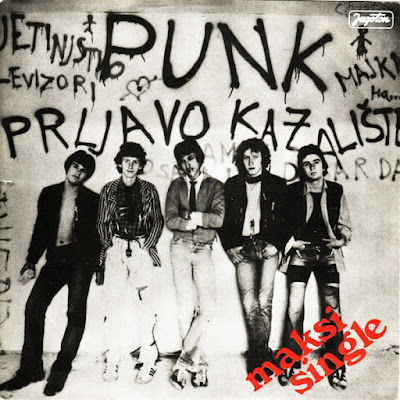Next post brings us to Yugoslavia and I give you some wikipedia info:
Prljavo Kazalište (meaning in Croatian language: Dirty Theatre) is a rock band from Zagreb, Croatia. Since its formation in 1977, the group changed several music styles and line ups but remained one of the top acts of both the Croatian and the former Yugoslav rock scenes. Founding members included: Jasenko Houra (rhythm guitar), Zoran Cvetkovic a.k.a. Zok (lead guitar), Nino Hrastek (bass) and Tihomir Fileš (drums). Its first vocalist became Davorin Bogovic, although they were thinking about taking Davor Gobac (later of Psihomodo pop) instead. All of them, except Houra, previously played in another band called Ciferšlus (Zipper), but after he joined them to form a new group, they opted for the name Prljavo Kazalište after an episode of the satirical Italian comic book Alan Ford, which was very popular in the former Yugoslavia. In its early beginnings, Prljavo Kazalište's was a Punk band, although they initially wanted to sound like The Rolling Stones for whom they maintained a great admiration. The group performed live for a first time in 1978 at a gig organized by the magazine Polet where they were noted for their furious punk image and stage performance. In the same year, Prljavo Kazalište released its first single, the punk rock sounding Televizori for the major record label Jugoton.
In 1979, Suzy Records released their 2nd single 'Moj Je Otac Bio U Ratu'. That song was included in the great Novi Punk Val compilation which was compiled by Igor Vidmar, along with Pankrti, Paraf and other prominent artists of the former Yugoslav Punk scene. In 1979, they released their first eponymous album, produced by Piko Stancic, for Suzy Records. It was promoted when the group performed as a support act of the Yugoslav band Bijelo dugme at a concert held at the JNA Stadium. During the recording sessions, Zoran Cvetkovic left the band and was replaced by Marijan Brkic. The album soon came to prominence all over the former Yugoslav federation for its social commentary and provoked the then-ruling one-party system, additionally because it also featured probably the first gay-themed song in Yugoslavia titled 'Neki Djecaci (Some Boys)' (followed later by "Retko Te Vidam Sa Devojkama" by Idoli). The authorities valuated the album as "šund" ("Kitsch") and hence they imposed higher taxes on its sale price, while the records considered "truly artistic" enjoyed a reduced tax rate.
Both 7inches are quite cool and I recommend a listen to their albums.






